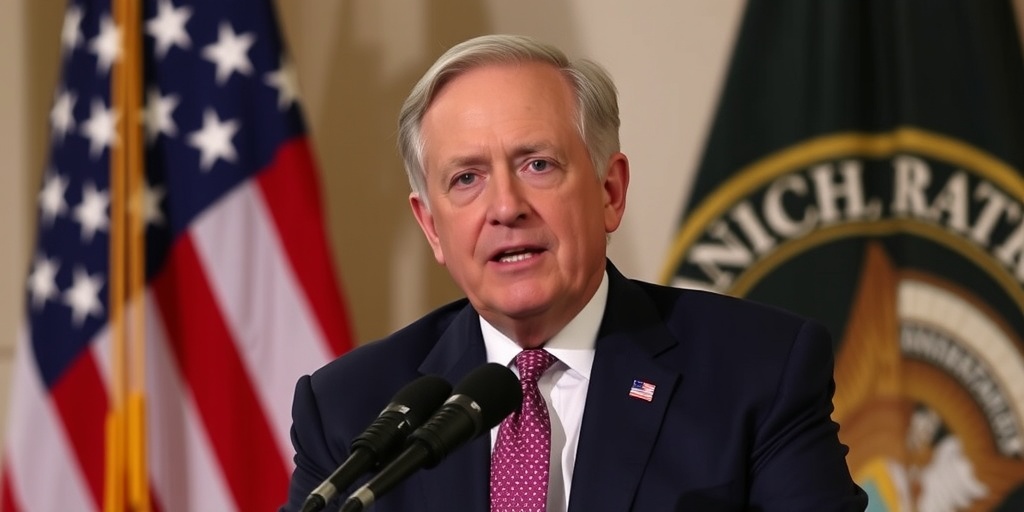Now Reading: Trump Administration Removes List of Federal Properties Up for Sale
-
01
Trump Administration Removes List of Federal Properties Up for Sale
Trump Administration Removes List of Federal Properties Up for Sale

Trump Administration Proposes Sale of Federal Properties Amid Controversy
On Tuesday, the Trump administration unveiled a controversial plan to sell off a significant number of federal properties, identifying over 440 properties nationwide as potential candidates for sale. This ambitious proposal included high-profile government buildings such as the headquarters of the Federal Bureau of Investigation (F.B.I.), the Department of Justice (DOJ), and the Department of Health and Human Services (HHS). The intention behind this initiative is to streamline government operations and save taxpayer dollars by disposing of what officials deem “underutilized federal office space.”
However, by Wednesday morning, the entire inventory of identified properties had mysteriously vanished from the General Services Administration (GSA) website, replaced by a message indicating that the list was “coming soon.” The GSA, the federal agency responsible for managing the government’s real estate portfolio, swiftly revised the list multiple times in response to mounting scrutiny. Notably, around 100 properties, many located in the Washington, D.C. area, were removed shortly after the initial announcement, raising eyebrows regarding the administration’s commitment to the proposed plan.
The rapid changes and lack of clarity surrounding the list sparked confusion among lawmakers, officials, and the public. While the Trump administration argued that selling off these properties could lead to substantial cost savings—potentially amounting to hundreds of millions of dollars—critics were quick to voice their concerns. Democratic lawmakers and various advocacy groups expressed alarm over the potential ramifications of the property sales on federal government services across the country.
Senator Elizabeth Warren was among those who expressed opposition to the initiative, stating that she believes the “disposal” of critical federal properties could jeopardize crucial services that rely on these offices. “Selling off our government buildings to the highest bidder doesn’t just threaten the jobs of federal employees,” Warren stated. “It poses serious risks to the health, safety, and well-being of American families who rely on these essential services every day.”
This debate highlights a broader issue within the Trump administration’s approach to government efficiency and budget reduction. The administration has long championed the idea of minimizing government expenditure by selling off assets and property it considers redundant or underutilized. In this case, officials argue that the proposed property sales would not only cut costs but also allow the government to focus more on its core functions without the burden of maintaining excess infrastructure.
Supporters of the plan, including some administrative officials, emphasized that many of the identified properties have been underused for years. They argued that the sale of these assets would result in financial reinvestment opportunities for the federal government while potentially spurring economic growth in the private sector as these properties transition to new ownership.
Nonetheless, the administration’s proposal faces steep challenges. Lawmakers from both parties, as well as various public interest advocates, have raised alarms about the lack of transparency associated with the announcement. The sudden removal of the property list raises questions about what criteria were used in determining which properties were on the list, as well as what specific plans the administration has for the remaining federal properties.
Amidst this uncertainty, questions remain about the fate of the properties that were initially listed. How will the administration balance its financial goals with the important services that these properties support? The GSA’s need for transparency and accountability has been underscored by the backlash following the announcement, and any future steps taken in this process will likely be scrutinized closely by lawmakers and the public alike.
The entire incident underscores the delicate nature of government property management, especially during a time of growing fiscal conservatism. As the Trump administration navigates this contentious landscape, both sides must grapple with the implications of their decisions on federal service delivery and the broader impact on the communities that rely on these government facilities.
As of now, the GSA has not provided a clear explanation for the removal of the property list or when it may be made available again. Stakeholders remain eager for further information, and the fate of the proposed sales hangs in the balance as the administration continues to evaluate its strategy and the reactions from the public and Congress. With the potential for significant financial implications and public service considerations involved, this developing story is far from over.
Stay Informed With the Latest & Most Important News
Previous Post
Next Post
-
 01New technology breakthrough has everyone talking right now
01New technology breakthrough has everyone talking right now -
 02Unbelievable life hack everyone needs to try today
02Unbelievable life hack everyone needs to try today -
 03Fascinating discovery found buried deep beneath the ocean
03Fascinating discovery found buried deep beneath the ocean -
 04Man invents genius device that solves everyday problems
04Man invents genius device that solves everyday problems -
 05Shocking discovery that changes what we know forever
05Shocking discovery that changes what we know forever -
 06Internet goes wild over celebrity’s unexpected fashion choice
06Internet goes wild over celebrity’s unexpected fashion choice -
 07Rare animal sighting stuns scientists and wildlife lovers
07Rare animal sighting stuns scientists and wildlife lovers



















